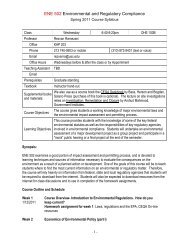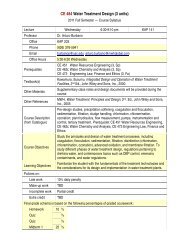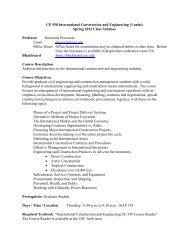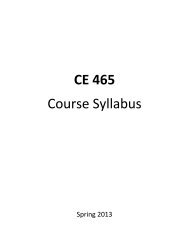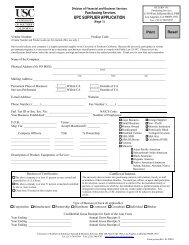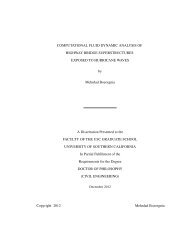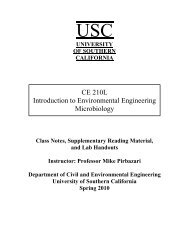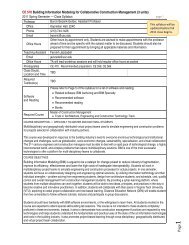CE 460 Course Syllabus - USC
CE 460 Course Syllabus - USC
CE 460 Course Syllabus - USC
Create successful ePaper yourself
Turn your PDF publications into a flip-book with our unique Google optimized e-Paper software.
<strong>CE</strong> <strong>460</strong><strong>Course</strong> <strong>Syllabus</strong>Fall 2012
Part I <strong>Course</strong> Organization
SYLLABUS<strong>CE</strong> <strong>460</strong>Fall 2012GFS 116Tuesdays 6:30-9:10Text: Construction Contracting, 7 th edition, by Clough/Sears(ISBN 0-471-44988-1) WileyProfessor Henry M. KoffmanKAP 222Phone: 213-740-0556 Fax: 213-744-1426Email: koffman@usc.eduTA:Iman YadegaranKAP 239Email :iyadegar@usc.eduOffice Hours:Tuesdays 12-2 PMWednesdays 12-2 PMBlackboard: http://blackboard.usc.edu8/28 Introduction/Industry/Project/Overview9/3 LABOR DAY – No Classes9/4 Autobiographies [with recent color picture] DueGuest Speaker: Jay Fischer – The Catalina ProjectChapter 1: The Construction IndustryChapter 2: Business OwnershipChapter 3: Company Organization
9/11 Chapter 4: Drawings & SpecificationsChapter 5: Estimating & BiddingChapter 6: Construction ContractsEthics Group #1 PresentationQuiz #1: Chapter 1-3Homework #1 Due:1.1-1.4, 1.6-1.8, 1.11-1.15, 1.182.1, 2.3, 2.6, 2.8-2.119/18 Chapter 7: Construction InsuranceChapter 8: Contracts Surety BondsEthics Group #2 PresentationHomework #2 Due:3.1 – 3.64.1 – 4.99/25 Guest Speaker: Nate Arnold - LEEDQuiz #2 Chapters 4-8Chapter 13: Labor Law ManagementChapter 14: Labor RelationsEthics Group #3 PresentationHomework #3 Due:5.1, 5.4 – 5.7, 5.9, 5.10, 5.12, 5.14, 5.17, 5.19, 5.25, 5.276.2, 6.8, - 6.1610/2 Chapter 9: Business MethodsEthics Group #4 PresentationHomework #4 Due:7.1 – 7.98.1 – 8.1310/9 MIDTERM: Chapters 1-810/16 Chapter 10: Project Management & AdministrationEthics Group #5 PresentationTerm Paper Topics Due
10/23 Guest Speaker: Shobhit Baaddkar - BIMChapter 11: Project Time ManagementEthics Group #6 PresentationHomework #5 Due:9.1 – 9.610.1, 10.2, 10.4 – 10.9, 10.12 – 10.14Quiz #3 Chapter 12 Take Home10/30 Chapter 12: Project Cost ManagementEthics Group #7 PresentationTerm Paper DueHomework #6 Due:11.1 – 11.4, 11.7 – 11.10Take Home Quiz #3 Due11/6 Chapter 15: SafetyEthics Group #8, #9 PresentationQuiz #4 Chapters 9, 10, 11, 13, 14Homework #7 Due:12.1 – 12.713.1 – 13.1114.1 – 14.3, 14.6 – 14.9, 14.1111/13 Field TripHomework #8 Due:15.2 – 15.4, 15.6, 15.7, 15.12 – 15.1411/20 Term Paper DuePaper/Oral Presentations11/22 THANKSGIVING – No Classes11/27 Paper/Oral Presentations12/4 Class/Teacher/TA/ABET/EvaluationsPaper/Oral Presentations12/18 FINAL: Chapter 9-15 7-9pm
POLICIESExaminations:All examinations will be closed book. Notes will not be allowed. Make-up examinations will begiven under extraordinary circumstances only. Missed quizzes will count as zero if priorauthorization is not granted. Honor system is observed.Grading/Values:Classroom Participation 5%Homework 5% A- to A+ = > 90%Midterm 30% B- to B+ = > 80% or “WeightedCurve”Final 30% C- to C+ = > 70%Paper and Oral Presentations 15% D- to D+ = > 60%Quizzes 15% F < 59%**Note: Quizzes cannot be made up without prior authorization from the Professor.Missed quizzes will count as zero.<strong>Course</strong> Content:A. Objectives:1. Fulfill degree requirement.2. Become familiar with Construction Management/Methods.3. Understand the principles of project management,cost/schedule/methods/terminology, contract administration.4. Skill development for successful job performance, especiallycommunications, both written and verbal.5. Ethics comprehension.6. Teamwork.B. Instructions:1. Includes reading assignments, lectures, example problems, homework,examinations, a term paper, an oral presentation and field trips.2. Intention in lecture is to: focus on key ideas, work example problems, leaveless important detail for reading and question asking.3. Students will be expected to fully participate in classroom discussions andproblem solving.4. Industry speakers will present their views and opinions.5. Tardiness will not be tolerated.6. Absences are only excused with prior notification visa e-mail and/ortelephone. Three (3) unexcused absences will result in a failure grade.7. Cell phones, pagers, etc. must be turned off.
C. Reading Assignments1. Reading Assignments are identified on the course agenda.2. It is important to keep up with the reading since it will form the basis forclassroom discussions.D. Extra Credits:1. Extra Papers2. Professional organizational activities and membership in AS<strong>CE</strong>, AGC,CMAA, etc.3. Field trips4. Seminars, Symposiums Conferences, etc. (AGC Symposium #19, AS<strong>CE</strong>PSWRC at <strong>USC</strong>, SPARKS Competition, AS<strong>CE</strong> National Convention,CMAA National Conference.)E. Student Conduct1. Students are Responsible for adhering to “Academic Responsibility.”F. Students with DisabilitiesAny student requesting academic accommodations based on a disability is required toregister with Disability Services and Programs (DSP) each semester. A letter ofverification for approved accommodations can be obtained from DSP. Please be sure theletter is delivered to me as early in the semester as possible. Your letter must be specificas to the nature of any accommodations granted. DSP is located in STU 301 and is open8:30 am to 5:30 pm, Monday through Friday. The telephone number for DSP is (213)740-0776.G. Academic Integrity1. The University, as an instrument of learning, is predicated on the existence ofan environment of integrity. As members of the academic community,faculty, students, and administrative officials share the responsibility formaintaining this environment. Faculties have the primary responsibility forestablishing and maintaining an atmosphere and attitude of academic integritysuch that the enterprise may flourish in an open and honest way. Studentsshare this responsibility for maintaining standards of academic performanceand classroom behavior conducive to the learning process. Administrativeofficials are responsible for the establishment and maintenance of proceduresto support and enforce those academic standards. Thus, the entire Universitycommunity bears the responsibility for maintaining an environment ofintegrity and for taking appropriate action to sanction individuals involved inany violation. When there is a clear indication that such individuals areunwilling or unable to support these standards, they should not be allowed toremain in the University.” (Faculty Handbook, 1994:20)2. Academic dishonesty includes: (Faculty Handbook, 1994: 21-22)Examination behavior – any use of external assistance during anexamination shall be considered academically dishonest unlessexpressly permitted by the teacher.
Fabrication – any intentional falsification or invention of data orcitation in an academic exercise will be considered a violation ofacademic integrity.Plagiarism – the appropriation and subsequent passing off of another’sideas or words as one’s own. If the words or ideas of another are used,acknowledgment of the original source must be made throughrecognized referencing practices.Other Types of Academic Dishonesty – submitting a paper written byor obtained from another, using a paper or essay in more than one classwithout the teacher’s express permission, obtaining a copy of anexamination in advance without the knowledge and consent of theteacher, changing academic records outside of normal proceduresand/or petitions, using another person to complete homeworkassignments or take-home exams without the knowledge or consentof the teacher.3. The use of unauthorized material, communication with fellow students forcourse assignments, or during a mid-term examination, attempting to benefitfrom work of another student, past or present and similar behavior that defeatsthe intent of an assignment or mid-term examination, is unacceptable to theUniversity. It is often difficult to distinguish between a culpable act andinadvertent behavior resulting from the nervous tensions accompanyingexaminations. Where a clear violation has occurred, however, the instructormay disqualify the student’s work as unacceptable and assign a failing markon the paper.H. Return of <strong>Course</strong> AssignmentsReturned paperwork, unclaimed by a student, will be discarded after 4 weeks andhence, will not be available should a grade appeal be pursued following receipt ofhis/her grade.
Part II Detailed <strong>Course</strong>Objectives
<strong>CE</strong> <strong>460</strong>Construction Engineering3 Units<strong>USC</strong> | SONNY ASTANI DEPARTMENT OF CIVIL AND ENVIRONMENTAL ENGINEERING<strong>Course</strong> Information, Textbook, and Supplementary MaterialsABET <strong>Course</strong> <strong>Syllabus</strong><strong>Course</strong> Description: Introduction to the construction processes; estimating and bidding, constructionadministration, planning and scheduling, equipment and methods, labor relations, cost control systems,and safety.Required for: BS<strong>CE</strong> StructuralPrerequisite: noneCo-Requisite: noneElective for: BS<strong>CE</strong> and BS<strong>CE</strong> Building ScienceRequired Textbook: Sears, S. Keoki, Glenn A. Sears, and Richard H. Clough.Construction Contracting: A Practical Guide to Company Management, 7 th ed.Hoboken: Wiley & Sons, Inc., 2005.Reference: noneTopics CoveredDevelopment ofprofessional skillsEthicsNetworkingPrinciples of ConstructionManagement andMethodsLearning OutcomesStudents will have learned:1. Site safety2. Labor law and labor relations3. Project cost management4. Project time management5. Business methods6. Bonds and insurance7. Cost estimating and bidding8. Drawings and specifications9. Company organization10. Business ownership11. The construction company12. Construction contracts and law13. Ethics14. To research, organize, and write a technical paper15. To prepare and orally present a technical paper16. To differentiate various ethical behaviors17. To learn various codes of ethics18. How to join professional organizations (AGC, AS<strong>CE</strong>, etc.)19. About opportunities to attend professional conferences, meetings,symposia, etc.20. About professional registration21. Construction vocabulary22. Critical path method23. Unbalancing24. The construction processPage 1
<strong>CE</strong> <strong>460</strong>Construction Engineering3 Units<strong>USC</strong> | SONNY ASTANI DEPARTMENT OF CIVIL AND ENVIRONMENTAL ENGINEERINGLecture and Lab ScheduleLectureLabSessions per Week Duration per Session Sessions per Week Duration per Session1 3 n/aContribution of <strong>Course</strong> to Meeting the Professional ComponentEngineering TopicsIn this course, students will further develop their professional skills and networking capabilities,understand the importance of ethics along with the principles of construction management andmethodsRelation of <strong>Course</strong>Objectives to Program OutcomesThe Civil Engineering program is designedto teach beyond the technical content of thecurriculum and prepare the students toutilize what they learn in a professionalsetting.This course contributes to the programoutcomes as outlined in the adjacent table.<strong>Course</strong> Contribution to Program Outcomes (a-k)a. An ability to apply knowledge of mathematics, science, andengineering.Keyd. An ability to function on multi-disciplinary teams. e. An ability to identify, formulate and solve engineering problems.f. An understanding of professional and ethical responsibility. g. An ability to communicate effectively. h. The broad education necessary to understand the impact ofengineering solutions in a global economic and environmental andsocietal context.i. Recognition of the need for, and an ability to engage in life-longlearning.j. Knowledge of contemporary issues.k. An ability to use the techniques, skills, and modern engineeringtools necessary for engineering practice.Prepared by:Professor Henry M. Koffman, P.E.Director, Construction Engineering and Management ProgramDate: Fall 2012Page 2


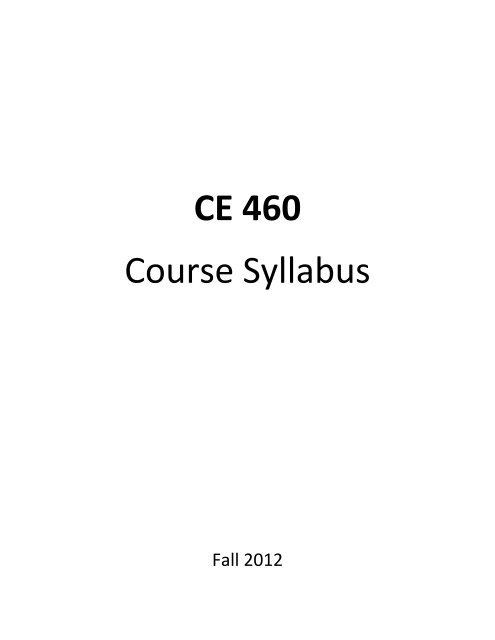
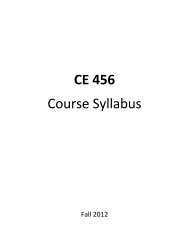
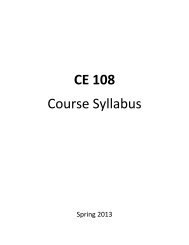
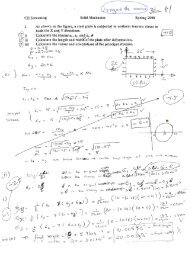
![Dr. Yan Xiao Bamboo Road Bridge can Support 16-Ton[ne] - USC](https://img.yumpu.com/37910641/1/190x245/dr-yan-xiao-bamboo-road-bridge-can-support-16-tonne-usc.jpg?quality=85)
